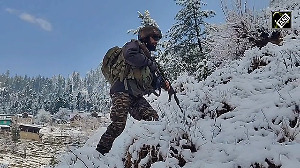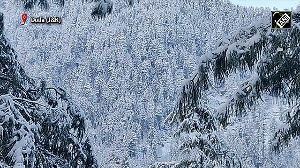Gen Pervez Musharraf has at long last become Gen (retired) Pervez Musharraf, a little more than nine years after Nawaz Sharif, the then Pakistani prime minister, appointed him as the Chief of the Army Staff in October 1998, after superseding two Lt Gens who were senior to him. They reportedly had a better record as professionals, but had the reputation of not being amenable to political pressure. Nawaz thought that Musharraf would be more submissive as the chief than the two officers senior to him and hence made him the chief.
In doing so, he committed the same mistake as the late Zulfiqar Ali Bhutto, as prime minister, did in 1976 when he appointed Zia-ul-Haq as the COAS after superseding two Lt Gens senior to him who had the reputation of being independent and assertive. Shortly after Zia took over as the chief, the Shah of Iran visited Pakistan. While introducing Zia to the Shah, the flamboyant Bhutto was reported to have remarked: 'Meet my new Army chief. He is totally loyal to me. If I ask him to stand, he will stand. If I ask him to sit, he will sit. If I ask him to salute, he will salute. With him as the chief, the Army is in safe hands.' Zia gave Bhutto one of his sheepish grins and saluted him. In 1977, he overthrew Bhutto and sent him to the gallows in 1979.
Nawaz too thought that Musharraf would be totally loyal to him and that with him as the chief, he would not have to fear any threat to his position from the Army. He was proved wrong just as Bhutto was. Musharraf had him overthrown in October 1999, and sent on long exile to Saudi Arabia after having got him convicted by a rubber stamp court as a terrorist and a hijacker under the Anti-Terrorism Act.
As Gen Ashfaq Pervez Kiyani (his name is spelt as Kiyani as well as Kayani) starts functioning as the COAS, Musharraf must be wondering whether Kiyani could one day do to him what he himself did to Nawaz and what Zia, his mentor, did to Bhutto.
In the early 1990s, when Benazir Bhutto was prime minister for a second time, the Economist of London had described Pakistan as the land of Aurangazebs. Its children are taught in schools that Aurangazeb was the greatest ruler the Indian subcontinent had ever produced in its history. There is an Aurangazeb lurking inside every Pakistani ruler -- political or military. Is there an Aurangazeb lurking inside Kiyani, who may one day stab Musharraf in the back?
That fear is for the future. Today, Kiyani has the reputation of being totally loyal to Musharraf. That was why Musharraf selected him to succeed him as the chief. However, it must be said to the credit of Musharraf that he did not supersede any officers senior to Kiyani. He went purely by seniority and merit. Kiyani was on the top of the seniority list and had the reputation of being a professional to his finger tips. Moreover, he enjoyed the total confidence of the US, where he had done some training courses, and was a well-known and well-liked figure in the corridors of the Pentagon and the Central Intelligence Agency.
At a time when the so-called war against Al Qaeda and the neo Taliban has not been going well and when Osama bin Laden and his No 2 Ayman al-Zawahiri are proving to be as elusive as ever, Washington, DC, needs in Islamabad political and military leaders who would not be detrimental to the US agenda of preventing another 9/11 in the US homeland emanating from the tribal lands of Pakistan and Afghanistan. It has high hopes that, acting in tandem with Musharraf, Kiyani would deliver where Musharraf was not able to despite his supposedly best efforts. To give a cloak of political acceptability to the US agenda, it wants Benazir as a 'duly elected' prime minister, who would provide political backing to the US agenda.
Will Kiyani be able to deliver, if not bin Laden and Zawahiri, at least others such as Mulla Mohammad Omar, the amir of the neo Taliban, Baitullah Mehsud, who is the de facto ruler of South Waziristan, and Maulana FM Radio Fazlullah, the de facto ruler of the Swat Valley?
Kiyani comes to office as the COAS with impeccable credentials. He has the distinction of being the first director-general of the Inter-Services Intelligence to be appointed as the COAS since Pakistan became independent in 1947. Ehsanul Haq was also the DG, ISI, before he became the chairman, Chiefs of Staff Committee. Kiyani is the son of a non-commissioned officer of the Army. His humble background as the son of an NCO has endeared him to the junior ranks of the Army. At a time when there are signs of some demoralisation in the junior ranks fighting against Al Qaeda and other jihadi organisations in the Pashtun belt, high hopes will be placed on him for reversing the process of demoralisation.
Kiyani is also a non-controversial officer who had in the past not come to notice for any dubious association with the Taliban or Al Qaeda or any of Pakistan's fundamentalist organisations. He was liked by the political leaders who were attracted by his unassuming nature and humble demeanour. A man of few words, he is quite a contrast to Musharraf, a braggart. His reputation as an apolitical officer went up during the recent controversy over Musharraf's suspension of Chief Justice Iftikhar Mohammad Chaudhury of the Pakistan Supreme Court.
Knowledgeable sources said at the meeting held at Musharraf's office in March 2007, at which the decision to suspend him was taken, Kiyani was the only person who kept quiet and did not utter a word either in support of Musharraf's decision or in criticism of the Chief Justice. It was also reported that he kept the ISI out of this unsavoury controversy and that it was the Directorate-General of Military Intelligence and the Intelligence Bureau which played the leading role in the campaign to denigrate the former Chief Justice, which ultimately boomeranged on Musharraf.
Kiyani, who joined the Pakistan Army in 1970, started his career in the Baloch Regiment as an infantryman. He did not come to public notice till Benazir Bhutto, during her first tenure as the prime minister (1988-90), chose him as her deputy military secretary. The two have since maintained their personal friendship despite the ups and downs in her political career.
Kiyani is believed to have a wide network of contacts in the US Armed Forces, but he really attracted the attention of the US' political and military leadership at the time of the Indo-Pakistan military confrontation in 2002 after the terrorist attack on the Indian Parliament on December 13, 2001. He was the Director-General, Military Operations at that time and the US was reportedly impressed by the cool manner in which he handled the crisis.
In September 2003, he was appointed the corps commander of the X Corps at Rawalpindi. It was the X Corps that had launched the coup of October 1999 which brought Musharraf to power. No military coup in Pakistan could be successful without the X Corps being in the forefront of the coup. All military chiefs chose their most trusted officer to head it. The fact that Musharraf chose him for this key post spoke of his confidence in him as a trustworthy officer, who would do his bidding.
As corps commander, Musharraf made him responsible for co-ordinating the investigation into the two attempts to assassinate him in Rawalpindi in December 2003. Apart from identifying some of the jihadi terrorists responsible for the attempts, Kiyani also managed to establish the involvement of some junior officers of the Army and the Air Force in the attempts and had them arrested.
In October next year, he was appointed the DG of the ISI and once again impressed the US by his success in having Abu Faraj al-Libbi, an al Al Qaeda operative allegedly involved in the attempts to assassinate Musharraf, arrested in the tribal belt. He was immediately handed over to the US without properly interrogating him in connection with the attempts to kill Musharraf. Many Pakistani sources, however, have not accepted the claim of the ISI and that of the US that Abu Faraj was the No 3 in Al Qaeda and had masterminded the attempts to kill Musharraf. Subsequent evidence has not proved their claims.
Even though Kiyani was projected as a highly successful DG of the ISI, facts speak otherwise. It was during his tenure as DG of ISI that the neo Taliban staged a comeback with a bang, the Pakistan Army practically lost control over the Pashtun belt and Al Qaeda established its sanctuaries in Pakistani territory.
The US has strongly backed his elevation as the COAS because of his known loyalty to Musharraf, his friendship with Benazir Bhutto and its hopes that he would improve the morale of the Army and vigorously pursue Al Qaeda & co. Its hopes in him may ultimately be belied just as its hopes in Musharraf were. The US has never been a good judge of Pakistanis and particularly of Pakistani Army officers. Will it be different this time? Let us wait and see.
Since he took over as the vice-chief of the Army Staff on October 8, 2007, Kiyani has been co-ordinating the military operations to re-establish the writ of the government over the Swat valley. He has not been very successful so far. The tribals of Swat valley, ably led by Maulana Fazlullah and backed by Al Qaeda, the Islamic Movement of Uzbekistan, the neo Taliban and the Jaish-e-Mohammad have been putting up a stiff fight against the Pakistani Army, despite its use of helicopter gunships and heavy artillery.
Kiyani's policy of over-relying on helicopter gunships and heavy artillery and avoiding ground confrontations has already come in for criticism in Pakistani military circles. Faced with this criticism, he has only now sent his troops to engage the terrorists in ground confrontations. Kiyani has promised that he would eject the terrorists from the Swat valley before the elections and re-establish the writ of the State. If he does not succeed, his reputation as the COAS could take a beating.
Till the elections in the beginning of January next, Musharraf is expected to handle the political management of the country and Kiyani the operational management and the fight against terrorism. A new prime minister would join the government after the elections, constituting a triumvirate.
Who will it be? Benazir, who is preferred by the US but intensely disliked by many corps commanders because of her confrontational style? Nawaz or his brother Shahbaz Sharif, who have many friends among the Punjabi corps commanders despite Nawaz's confrontation with the Army in October 1999 but are distrusted by Musharraf and the US? Shujjat Hussain or someone else from the rubber-stamp Pakistan Muslim League-Qaide Azam, who were the creations of Musharraf and will remain his poodles as they were during Musharraf's first tenure as the President?
Whoever joins the triumvirate after the elections, power will be shared unequally with Musharraf as the president, the commander-in-chief of the armed forces and the chairman of the National Security Council retaining the bulk of it in his hands. There are elements of potential conflict and instability. Musharraf can assume special powers as he did after imposing the Emergency on November 3, 2007, but only Kiyani as the COAS can help him enforce his powers. Otherwise, they will remain only on paper. Till now, Musharraf assumed the special powers as the president and had them enforced as the COAS. With the second hat gone, he will have to depend on Kiyani to keep his teeth biting sharp.
Even if they do very well in the elections, neither Benazir nor Nawaz can become the prime minister unless Musharraf issues an ordinance removing the present ban imposed by the previous National Assembly on anyone holding office as the prime minister for more than two terms. Will he oblige them?
Kiyani, as the COAS, will have under him over 30 Lt Gens, who owed their rise to this position to Musharraf. Will they transfer their total loyalty to Kiyani or will they have divided loyalty? Will Musharraf resist the temptation to encourage them to look up to him for favours and orders, thereby reducing Kiyani to a figure-head COAS? Will he give Kiyani a free hand in running the Army by not interfering with his powers of promotion and postings of senior officers?
The future course of events in Pakistan in 2008 would depend on the answers to these questions. Even after shedding his uniform, Musharraf will be on paper one of the most powerful presidents Pakistan has had. He has seen to that by repeatedly fiddling with the Constitution and the laws of the land. But he may find himself reduced to a paper tiger if Kiyani asserts himself and insists on playing his due role as the COAS.
As the dramatis personae in Islamabad play out the drama, there is a man up there in the tribal north waiting and watching, hoping that Pakistan and its nuclear arsenal would ultimately fall into his hands. His name is Osama bin Laden. He wears no hats and is not part of the triumvirate, but his threatening shadow will continue to hover over Pakistan till the Al Qaeda is defeated and neutralised. That is not for tomorrow.
(The writer is Additional Secretary (retd), Cabinet Secretariat, Government of India, New Delhi, and, presently, Director, Institute For Topical Studies, Chennai. E-mail: seventyone2@gmail.com)






 © 2025
© 2025